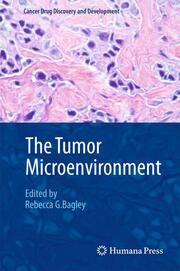-
Zusatztext
-
The fact that tumors are composed of both tumor cells and host cells has long been known. These tumor-associated cells include vascular endothelial cells and pe- cytes, as well as inflammatory cells such as neutrophils, monocytes, macrophages, mast cells and eosinophils, and lymphocytes. The tumor cells also interact with stromal cells and with elements of the tissue extracellular matrix. What has been less appreciated is the role that these cells could have in modulating the growth, invasion, and metastasis of the tumor. Early on, the elements of what we now call the tumor microenvironment were considered to be more or less innocent bysta- ers to the role of the tumor cells as they grew and invaded local sites. Today, there is an increased understanding of the critical role of the tumor microenvironment as dramatically influencing the course of tumor development and dissemination. This volume represents a superb compilation of the latest thoughts and data regarding the role of each essential component of the tumor microenvironment in cancer development and progression. Perhaps, the earliest recognition of the role of nonmalignant cells as cancer re- lators was the recognition that lymphocytes can participate in what was termed "immune surveillance" in the 1960s. Our understanding of tumor immunity has improved markedly since then, and there are now successful clinical studies sh- ing the potential use of immune-based therapies in cancer treatment.
-
-
Kurztext
-
The field of cancer biology and developmental therapeutics is continually evolving as new methodologies are developed and new targets are discovered. Although multiple therapeutics directly target the malignant cells these drugs rarely prevent recurrence of disease or the progression of metastasis. The complex biology of tumors presents challenges in designing treatments that will eliminate the malignant cells as well as the supporting network of vasculature and stroma that allows for the comparison of tumors to developing organs in embryos. In addition to blood vessels and malignant cells, tumors consist of fibroblasts, immune and inflammatory cells, and a myriad of proteins that comprise the extracellular matrix. Effective eradication of malignant disease requires therapeutic strategies that factor in targeting the tumor microenvironment. In the past decade, a new class of anticancer drugs has emerged that interferes with tumor angiogenesis; however the clinical benefit from treatment with the first generation antiangiogenic agents added to the standard of care is often modest. Thus, there remains a critical need to understand the tumor microenvironment and to develop anti-cancer therapies that address this aspect of malignant disease. The first edition of The Tumor Microenvironment is intended to give a current perspective on the role of the tumor microenvironment in malignant progression and detail strategies for novel therapies directed towards the cellular matrix. This book explores the many biological and physiological aspects of the tumor as a tissue and includes chapters on the variety of cells that influence tumor growth and spread as well as the cell-associated and soluble proteins that can promote invasion and metastasis. Several chapters describe endothelial cells and pericytes that form tumor vasculature. Insights into the role of progenitor and stem cells are included. The contribution of the supporting stroma is addressed in addition to cell-cell signaling and cell-matrix interactions. Additional chapters describe the influence of infiltrating cells of the immune system on tumor growth. The Tumor Microenvironment is the definitive text detailing cutting edge research by experts in the field and will be a valued resource in the study of this important area of cancer biology for many years to come.
-
-
Autorenportrait
- Rebecca Bagley is a senior scientist at Genzyme Corporation and has worked in the biotechnology industry for 20 years with degrees in biology from Wellesley College and Harvard University. Her expertise in drug development spans a wide range of approaches including immunotherapies, gene and protein therapies, and small molecule delivery with publications in journals such as Molecular Cancer Therapeutics, Cancer Research, and Microvascular Research. Her current research focuses on stem cells, tumor vasculature, and target validation.
Detailansicht
The Tumor Microenvironment
Cancer Drug Discovery and Development
ISBN/EAN: 9781441966148
Umbreit-Nr.: 1845804
Sprache:
Englisch
Umfang: xviii, 770 S.
Format in cm:
Einband:
gebundenes Buch
Erschienen am 09.09.2010
Auflage: 1/2010


